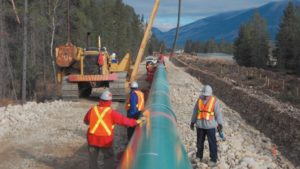Trudeau in Alberta for Trans Mountain talks

By Peter Kennedy
 Kinder Morgan Canada [KML-TSX] has wasted no time in deciding what to do with the $4.5 billion proceeds from the sale of the Trans Mountain Pipeline system and expansion project to the Canadian government.
Kinder Morgan Canada [KML-TSX] has wasted no time in deciding what to do with the $4.5 billion proceeds from the sale of the Trans Mountain Pipeline system and expansion project to the Canadian government.
KLM shareholders voted unanimously to accept the sale on August 30, 2018 – the same day that the Federal Court of Appeal quashed the approval of the $7.4 billion Trans Mountain Pipeline expansion on the basis that Canada’s efforts to meaningfully consult with indigenous people fell short.
Now KML shareholders are poised to reap the benefits of the decision to unload the controversial project after the KML board unanimously voted to distribute the net proceeds of the sale (after capital gains taxes, customary purchase price adjustments and repayment of KML debt) via a return of capital to shareholders.
The company said holders of KML’s restricted voting shares will pick up approximately $1.2 billion, or $11.40 per restricted share.
To facilitate the return of capital and provide flexibility for dividends going forward, KML will seek voting shareholder approval to reduce the stated capital of its restricted voting shares by $1.45 billion.
The company said its board has also unanimously approved a proposal to effect a consolidation of the restricted voting shares and special voting shares on a one-for-three basis. Subject to a reduction in stated capital and reverse split being approved by shareholders, the anticipated payment date for the proposed return of capital is expected to be January 3, 2019 with the reverse stock split to follow.
Meanwhile, the Canadian government has begun the painstaking process of delivering an exit strategy to Canadian taxpayers who are now the owners of a pipeline system with a very uncertain future.
Aside from the Federal Court of Appeal ruling, other hurdles include opposition from the British Columbia government, which has filed a reference case with the province’s top court to determine if it has jurisdiction to limit expanded shipments of heavy oil through the province.
British Columbia Premier John Horgan has said clarity is needed to ensure the B.C. government protects its coastline. Critics have argued that the move is a tactic to delay or block the project by creating more uncertainty.
Experts say Ottawa must now decide whether or not to re-do the environment assessment and address concerns about consultations with Aboriginal communities or try to appeal to the Canadian Supreme Court. It has been suggested that Ottawa could introduce legislation to move the project forward, but that is deemed unlikely.
Speaking to reporters in Edmonton on Wednesday September 5, Prime Minister Justin Trudeau said he wants to see “shovels in the ground as quickly as possible” because the project is in the country’s best interest, adding he also wants to satisfy the court’s concerns to avoid further litigation.
“We’re looking at various options, including legislation, including appeals, and we’re looking at what we need to do to satisfy the court,” he said. “We have to move forward on a path that takes the community and environmental assessments into account.”
Trudeau was in Edmonton for talks with Alberta Premier Rachel Notley who reacted to the Trans Mountain court decision by pulling Alberta out of the federal climate plan.
According to a CBC report, Notley had urged Trudeau to call an emergency cabinet meeting but he refused.
The discussions are expected to centre on a possible way forward for the pipeline expansion project.
Prior to the court ruling, Finance Minister Bill Morneau said Ottawa does not plan to be a long-term owner of the pipeline and is in negotiations with interested investors,
Meanwhile, after selling the pipeline to Ottawa, KML continues to manage a portfolio of strategic infrastructure across Western Canada, including:
- An integrated network of crude tank storage and rail terminals in Alberta that is one of the largest in the region;
- The Vancouver Wharves Terminal, the largest mineral concentrate export/import facility on the West Coast of North America;
- The Cochin pipeline system transporting light condensate from the United States to Fort Saskatchewan, Alta.
KML expects to pay an annual dividend of 65 cents per each post reverse stock split share. The proposals will be voted on at a special meeting of KML shareholders during the fourth quarter of 2018.
The company’s U.S. parent, Kinder Morgan Inc. [KMI-NYSE], has indicated to KML that it intends to vote its special voting shares in KML, which represents 70% of the voting shares, in favour of the proposals.
